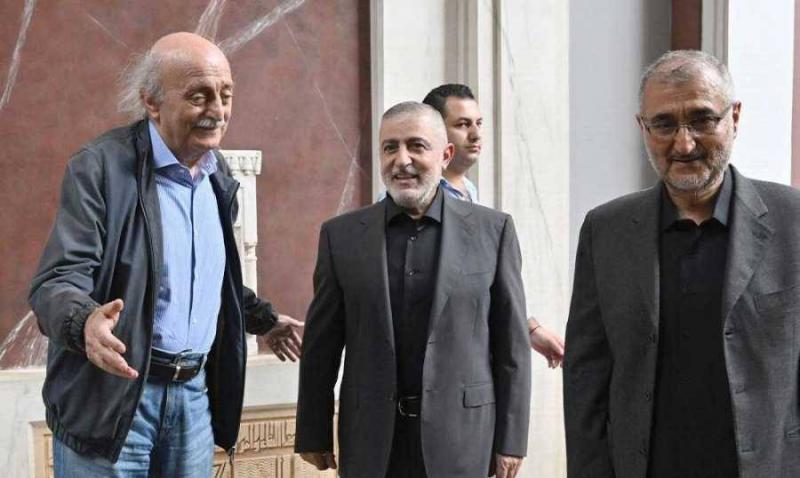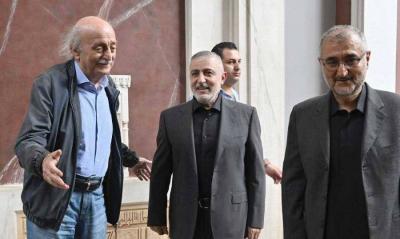The meeting between the leader of the Progressive Socialist Party, Walid Jumblatt, and a delegation from "Hezbollah" was merely the first step in a new phase of their bilateral relationship, which has become familiar for undergoing restoration and maintenance after every interruption and tension. Even when the rhetoric intensified some time ago amid election campaigns, one of the party's MPs advised a colleague from the more hawkish faction not to escalate too far, saying, "Because we will return to communication and dialogue after a while." This indeed happened a few weeks after the legislative elections concluded, with "diplomatic exchanges" being resumed between Clemenceau and Haret Hreik. Jumblatt clarified that he is awaiting answers to questions he had posed to the leadership of "Hezbollah" during his meeting with the political aide of the Secretary-General, Hussein Khalil, and the head of the liaison and coordination unit, Wafiq Safa.
But what are the party's motivations for responding positively to Jumblatt's initiative and call for dialogue? Sources explain that "Hezbollah" based its stance on the following considerations:
- The party did not initially decide to break away from the "Socialists," and even at the height of political tension, communication continued when necessary among members of both parties in the parliament. Notably, the party expected, based on previous experiences and Jumblatt's signals, that tensions would subside with the conclusion of the legislative elections, thus eliminating the need for mobilizing rhetoric.
- Jumblatt was the one who initiated the rapprochement, and it was natural for the party to respond since its local strategy is based on enhancing internal stability and engaging with others if they wish to. The party operates under the premise that the fewer enemies it has and the more controlled their behavior, the more this alleviates internal tensions and burdens in confrontations with external adversaries.
- The upcoming presidential election requires consultation with the widest possible spectrum of political forces, and the "Socialists" are naturally part of this, aiming for a common approach to this critical event, especially as the party and its allies no longer have a clear majority like they did in the previous assembly. Therefore, it is essential to attempt to find intersections around a candidate that receives the greatest possible support to secure a path to the Baabda Palace.
- President Nabih Berri is an ally of "Hezbollah" and a friend of Abu Taimour, and he was enthusiastic about their rapprochement. Consequently, this factor encouraged Haret Hreik to reciprocate Jumblatt's gesture.
Surrounding Jumblatt affirm that his recent openness towards "Hezbollah" is not merely a "bump" as many have perceived, but rather a differentiation in stance, while at the same time not abandoning his known approach to strategic contentious points, recognizing that addressing them now is unfeasible. Therefore, it's necessary to reorganize the disputes regarding them while separating them from attempts to find solutions to other less complex and sensitive issues.
Those monitoring Jumblatt's trajectory do not agree that his leniency towards the party stems from a bet on external transformations related to the Vienna negotiations or others. Rather, they believe it primarily reflects a conviction that there is no escaping collaboration in the end, as the Lebanese structure necessitates this meeting. "Why not initiate it at the least possible cost instead of waiting until later, when the cost of lost time has become greater for the exhausted country?"
Regarding external developments, his associates believe it is also prudent to keep up with and preempt them; if they take a positive turn, the internal ground will be ready to accommodate and build upon it, and if they turn negative, that ground will at least be fortified to mitigate the ramifications.
For Jumblatt, it is unavoidable to agree on a centrist president outside of what was known as March 8 and March 14, because "the balance of terror" in the council does not allow any side to impose a challenging president. Additionally, the qualities of Maronite Patriarch Bechara Al-Rai have already effectively excluded the candidates of the political alignments, namely Samir Geagea, Gibran Bassil, and Sleiman Frangieh, from the race. Geagea's insistence on a president who symbolizes a challenge is seen by those close to Jumblatt as a political consumption tactic aimed at raising the bar to improve the negotiation terms for the next president, "but he knows it is impossible for such a president to reach the Baabda Palace under the current balances."
Although the Democratic Gathering did not nominate Najib Mikati for the premiership during the mandatory consultations, this does not prevent those close to Clemenceau from indicating that the model of naming Mikati can be generalized to the presidential election. "Just as a convergence allowed his passage to the Grand Serail, away from the polarizing names on either side of the internal division, such a convergence can be achieved around an acceptable president for the republic who can rebuild bridges of communication with the outside, is non-provocative, maintains a neutral distance from everyone, and does not conspire against anyone internally, which would reassure 'Hezbollah' and convey the necessary trust."
From Clemenceau's perspective, any faction can obstruct the quorum if it serves its interests, "but the bill for such behavior would be extremely high this time, to the extent that it exceeds the Lebanese people's capacity to endure amid the escalating economic collapse in all sectors. Therefore, the scenario of obstruction that preceded Michel Aoun's election must not be repeated for the simple reason that the circumstances have changed economically and politically; what was possible before is no longer so now."




